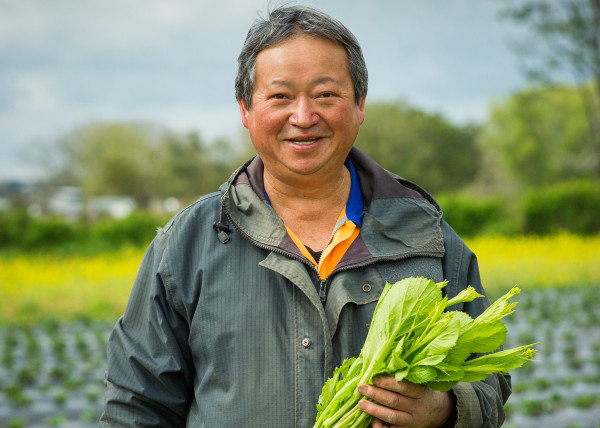Small but mighty vegetable growers – the backbone of Waikato’s vegetable supply
12 October 2022
Growers of novel vegetables and humble family-run businesses hold a certain prominence in Waikato’s supply of local, fresh vegetables. GEOFF LEWIS speaks to several small growers in the region who keep the area’s vegetable supply thriving.
Only a few kilometres away from Hamilton, on Horotiu Road in the Waikato, sits a humble family-run vegetable growing business, Te Kowhai Gardens, that has been operating since 1964.

Donald Sam and his gai choy – a fast-growing leafy green that can be harvested as soon as 25 days from transplant
Donald Sam, a second-generation grower, oversees the operation. He comes from a well-known market gardening family which, for many years, owned and ran the gardens on 'Chinaman's Hill', at Glenview – a landmark on SH3 just out of Hamilton.
Donald’s parents bought 30 acres at Te Kowhai about 60 years ago, just when Donald was born.
“I've been out here all my life,” Donald says. “I bought the place off Mum and Dad. Originally we supplied the wholesale vegetable market, but about 20 years ago we put in a shop and started to supply ourselves as well and cater to the demand from Chinese and Indian restaurants.”
Today, Te Kowhai Gardens has expanded to grow a wide range of vegetable crops with the aim of supplying the market year-round with a slant to Asian cuisine.
Brassicas, including Shanghai bok choy, pak choy and daikon radishes, along with six different varieties of mustard – including gai choy, the variety with the spiciest flavour.
“We pick these early when it turns into a leafy vegetable with a bit of a heart, which is very popular with Cambodian and Vietnamese communities for pickling.''
Added to these over the growing season are German cabbage, coriander, onions, broccoli, pumpkins, squash, spinach, kale, celery, beans, sweet corn, wax gourds, broad beans, watermelon and kamokamo – a member of the courgette family. Even puha gets a look-in, although Donald doesn't cultivate it specifically – the member of the dandelion family just “does its own thing,” Donald says. Sowing begins in early spring, and rather than grow large monocultures only a few rows of each crop are grown next to each other. Strawberries are one of the early summer crops that Donald will run for two years before planting anew.
Situated on the renowned Horotiu sandy loam, the Sam family have had the added benefit of being able to grow most crops – even in winter. The property also has a water bore, so strawberries and kamokamo can be drip-irrigated in summer.
Donald's wholesalers T&G Global and MG Marketing like the consistency of supply, and Te Kowhai Gardens is also a regular stall-holder at the Saturday Frankton Market in Hamilton.
Located on the same road as Te Kowhai Gardens is niche root vegetable grower, Timothy Cho.
A former electronics engineer, Timothy believes he is New Zealand's only commercial grower of Chinese yams.
Timothy arrived in New Zealand from South Korea in 1995 to study the Bible and English.
“I decided to stay here [after] passing Bible college and the English course,” Timothy says. “I started growing cucumbers, flowers and calla lilies, but learned the hard way. I leased land at Rangiriri but the area was very wet and I lost a lot of produce.''
Five years ago Timothy bought 21-ha at Horotiu, between Hamilton and Ngāruawāhia, opting to grow a niche vegetable, Chinese yams, under the name, The Roots Company. The site, just off the Horotiu Road, is otherwise surrounded by dairy and beef operations, and features a packhouse and coolstore.
Dioscorea polystachya or Chinese yam, as it is commonly called, is also referred to as cinnamon vine, Chinese potato or 'Ma' in Korean. Cultivated widely in east Asia, it is a perennial climbing vine and a flowering variety of the yam family. This tuber can be eaten raw, mashed and eaten with rice, and used in powdered form as a soup-thickening agent. Its edible tubers are also used in alternative medicine.
“It is a traditional root vegetable very popular in Korea, very nutritious with medicinal properties,” Timothy says. “A Chinese friend of mine asked me to grow it. I gained permission to import the seeds.”
Timothy runs a rotational growing system with about 100sqm harvested every day, leaving areas in fallow or fodder crops to allow the soil to recover and reduce the fungal load.
“Fungus loves it,” he says. “You have to rest the soil. The cold weather [also] suppresses the fungal problem.”
The Roots Company employs three full-time staff. Winter is Timothy’s busiest period, with harvest occurring from April through to October and planting also commencing in October each year. The plant is grown from 'bulb-lets' which are harvested from the vines on-site.
Harvest occurs weekly to even out the cash-flow, Timothy says.
Now in its third season, The Roots Company produces about 50 tonnes of yams a year which supplies all of New Zealand through wholesalers and mainly Chinese groceries, fetching $13/kg at wholesale price and an impressive $20/kg at retail.
